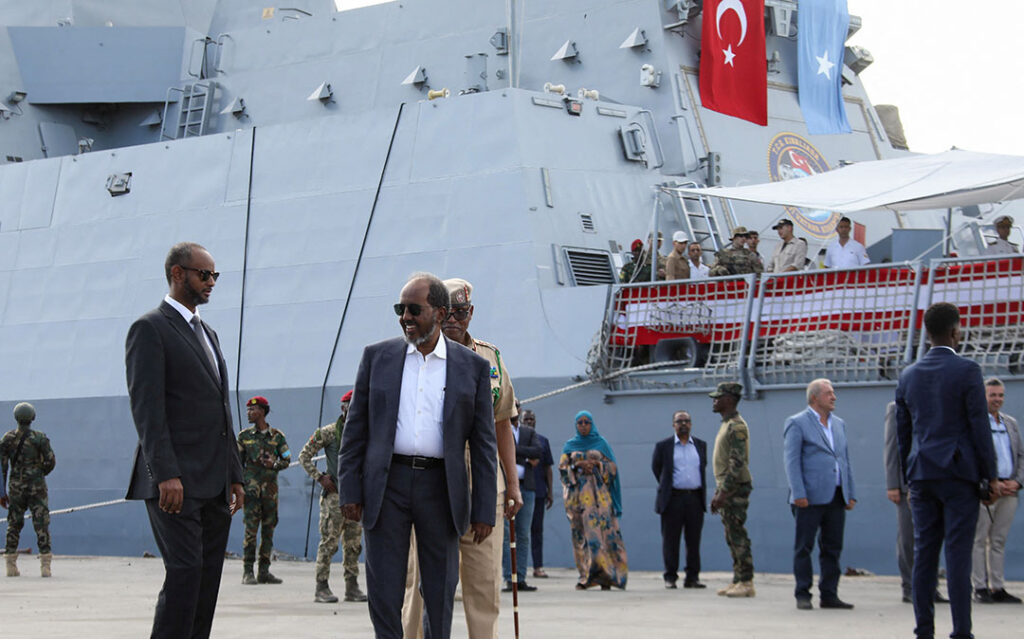ADF STAFF
Turkey’s growing presence in Africa is undeniable, and it’s by design. With its eyes on expanding influence, Turkey has significantly increased its engagement on the continent in recent years.
Turkish trade is booming, as its exports to Africa have nearly doubled in less than a decade. The number of Turkish embassies on the continent has risen from 12 in 2005 to 44 today.
Geopolitical Intelligence Services’ African affairs expert Teresa Nogueira Pinto says Turkey’s multifaceted investments are paying off, especially in the security sector.
“Already an important presence in North Africa and the Horn of Africa, Ankara has concluded defense agreements with countries in West and East Africa, including Ethiopia, Ghana, Kenya, Nigeria and Rwanda,” she wrote in an April 9 report.
“Although the specifics of the deals vary — ranging from security provisions and technical support to military training — they most often include provisions around arm sales.”
This year, the Turkish government is expected to approve a military agreement to train the Ugandan army and special forces as well as a pact with Mozambique to share military intelligence.
Turkey’s most significant partner in Africa is Somalia, where it established its largest foreign military base in the capital, Mogadishu, in 2017. For years, Turkey has provided military training for Somali troops, who are locked in conflict with the terrorist group al-Shabaab, an affiliate of al-Qaida.
Ethiopia’s port-access deal with the breakaway Somaliland region motivated Somalia to broaden its defense partnership with Turkey in February, and the Turkish warship Kinaliada F514 docked at the Port of Mogadishu on April 23, sending a clear message.
“Somalia’s security is also Turkey’s security,” Turkish Ambassador Alper Aktas said in a ceremony that day. “We have never considered Somalia’s stability separately from our own country’s stability.”
Turkish President Recep Tayyip Erdogan has made a concerted effort to boost his country’s status as a global power.
In Africa, Turkey casts itself as an alternative to Russia and China. Erdogan has gone so far as refer to Turkey as an “Afro-Eurasian” country.
“Erdogan’s administration is very eager to use the opportunities Turkey’s position gives, so Turkey automatically is a candidate to be a mediator country,” Professor of International Relations Ahmet Kasim Han, of Beykoz University, told the BBC.
“China and Russia compete over geopolitical influence in the region. The Turkish government believes its presence in Africa would help strengthen the country’s influence in world politics.”
Some of Turkey’s forays into Africa have, however, drawn criticism.
In 2020, the Turkish military intervened in support of the United Nations-recognized government of Libya and helped push the Libyan National Army out of the capital, Tripoli. Some saw Turkey’s efforts as a means to secure access to resources and maritime boundaries in the Mediterranean Sea region and counter the influence of Egypt and the United Arab Emirates.
Turkish drones have become an increasingly popular weapon in African conflicts, underscored by Turkey’s 27% growth in international defense and aerospace exports in 2023, reaching a record high of $5.5 billion.
“For African countries, Turkish defense products have many upsides,” Pinto wrote. “They are affordable and technically reliable, having been tested in Libya, Syria and, more recently, Ukraine.
“For countries facing insurgent movements, with under-resourced armies and porous borders, like Togo, Niger, Nigeria or Somalia, Turkey’s drones and counterterrorism expertise are especially valuable.”

